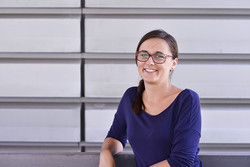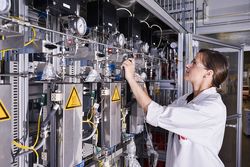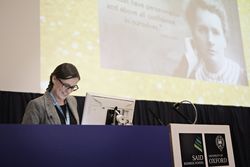Carbon dioxide for the oxidative coupling of alkanes
November 30, 2016
IPODI fellow, Dr. Ewa Nowicka is going to use the greenhouse gas carbon dioxide (CO2) as a mild oxidant to suppress over-oxidation of alkanes. She has proposed a bottom-up approach for designing catalyst for the oxidative coupling of methane (OCM) by combining oxidizing power of CO2 with the exceptional catalytic properties of cerium dioxide (CeO2).
In July 2016, Dr. Ewa Nowicka moved from Cardiff University, where she had been a postdoctoral research associate for four years, to Berlin University of Technology and joined Prof. Reinhard Schomäcker’s research group. Ewa Nowicka studied environmental chemistry in Poznan, Poland, from 2002 until 2007. After an Erasmus internship in Madrid, Spain, she conducted her PhD work in the field of heterogeneous catalysis at Cardiff University from 2008 until 2012.
UniCat asks Dr. Ewa Nowicka about her research and her scientific career.
Dr. Nowicka, the conversion of short chain hydrocarbons into higher value products has been a subject of studies for decades. Why do you focus on CO2 as an oxidant and cerium dioxide as a catalyst?
Indeed, especially activation of methane, its transformation into methanol as well as oxidative coupling into C2 products has been Holy Grail in catalysis. Having spoken with Dr Madan Bhasin, the pioneer of work on oxidative coupling of methane, I became much more interested in the subject. I was first introduced to CeO2 while working on the soot oxidation project. CeO2 possess very high oxygen storage capacity and when combined with O2 leads often to the total combustion of hydrocarbons. However, the combination with milder oxidant (CO2) can result in more selective catalysts. It has been reported that CO2 can dissociate on the reduced cerium oxide surface, supplying active oxygen species, which further will be used in the selective catalytic reaction.
You are collaborating with Professor Hajo Freund’s research group from the Fritz Haber Institute. What is his part within this cooperation?
With group of Prof. Freund and Dr. Shamil Shaikhutdinov we would like to look at the actual dissociation of CO2 on the CeO2. We aim to understand the process in greater details by using labelled oxygen for both preparation of cerium oxide film as well as CO or /and CO2.
You have successfully applied for an IPODI fellowship. IPODI is part of an European initiative that aims to increase the number of women in leadership positions. How did you become aware of the IPODI program? What are the special benefits for you?
I considered working in Berlin and joining UniCat already 2 years ago, so I was aware of IPODI program in general. However, I couldn’t apply earlier as the candidates are expected to have minimum 3 years of postdoctoral research experience. In April 2015, I visited the laboratory of Prof. Schomäcker with whom I discussed possible application. I considered different fellowship opportunities, however IPODI looked very attractive with similar benefits comparing to the other funding schemes.
As IPODI fellow I benefit from being part of UniCat and having chance to collaborate with the whole spectrum of researchers gathered within this cluster. In addition, as a research fellow, I am quite independent, therefore I can direct my research by myself, but still having possibility to work and interact with very experienced scientist from many fields.
How do you see yourself in two years?
I am quite an open-minded person, so I don’t exclude different options. However, since my work has been always carried out at university and I like teaching and communicating science, I would love to pursue my career in academia. As I mentioned earlier, IPODi is a very prestigious program, as only researchers with established research profile can apply for it. This fellowship also gives time to start applying for research grants as PI, which can be a foundation towards an independent research group or lecturer position.
Two weeks ago you have won the best speaker award at SPP2016, a popular science conference directed at researchers of Polish origin conducting their research at institutions outside of Poland. Do you like being involved in public understanding of science?
Yes, during my stay in Cardiff, I was involved in organizing outreach activities for nonscientific audience. I thoroughly enjoyed it and started learning how to communicate science in stimulating way. Therefore, I spent hours watching TEDex or Fame Lab videos.
What are TEDex and Fame Lab?
The idea of TEDex is to engage the community into mind blowing discussions after watching inspiring presentations, often intriguing and focusing only on one element. FameLab on the other hand, is a science and technology communication competition, where presenters have only 3 minutes to introduce the subject to a general audience. It is organized by the British Council.
Dr. Nowicka, during your scientific career you have moved from Poznan to Madrid, Cardiff, and Berlin. Probably, these were great changes in your life. What was the greatest one?
I love travelling and meeting new people so I fully enjoyed every location. I believe in scientific career it is extremely important to change the environment and get different perspective of life and work. Perhaps it sounds funny, but for the person who moved from Spain to the UK, the most difficult experience was the Welsh weather with the constant wind and rain. However, after 8 years, this weather conditions were so natural to me that after moving to Berlin, I expected the rain shower from every cloud.
Thank you very much for the interview.
The interview was conducted by Dr. Martin Penno.
Photos: TU Berlin/IPODI and SPP2016



